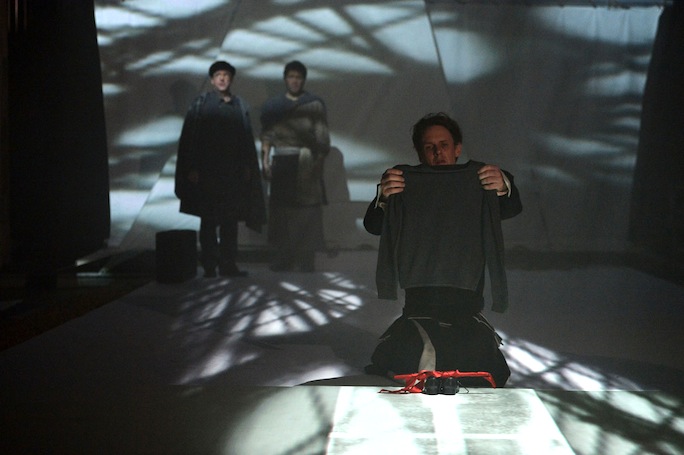
A merging of East and West
This past weekend saw the performance Benjamin Britten’s Curlew River – A Parable for Church Performance at Zellerbach Hall on the Berkeley campus. The mesmerizing multimedia version of this seldom performed opera was a Cal Performances co-production with the Barbican Centre, London, Lincoln Center for the Performing Arts, New York; and Carolina Performing Arts. Every penny was well spent by this admirable quartet of arts centers.
First performed in 1964, Curlew River is the first of three Church Parables by Britten. It takes its story from a 15th-century noh drama, Sumidagawa, by Juro Motomasa. The overall tone and style of the opera carry the pared-down quality of noh theater, which Britten merged with the similarly austere character of medieval Christian monastic life.
The story is part of the Madwoman genre of noh theater, in which a woman is driven mad by the loss of her lover, child or family. Once her missing loved one returns she regains her sanity. In this play the woman is returned her senses by the reassuring spirit of her dead child.
Under Netia Jones’ direction the stage is a stylized set of geometric forms: a thin sliver of a white boat sits upstage right hung with a triangular sail that continues down on the floor in the shape of a white long rectangle, which flows like a river to the front of the stage. The mast is topped by a yard creating a cross floating above the boat’s sail. To the right of the river runs a path of stones.
Seven musicians of the Britten Sinfonia sit stage left.
Both the sail and the rectangle were used like screens for the projection of video imagery. Black-and-white images of the sea’s surface and white birds on an imaginary wind rose and fell across the sets’ surfaces.
Into the extreme light and dark, a line of monks in gray robes with ideograms along the draping sleeves process across the stone path. Their feet crunch across the stones. The Abbott, sung with crystal clear diction by baritone Jeremy White, tells the audience that it is about to witness a mystery: “a sign of God’s grace.”
As the lights dim, the sail is backlit and the tall, thin, ascetic figure of tenor Ian Bostridge, reduced to black silhouette on white triangle, enters to walk across the stage and exit near the musicians.
When the lights return travelers are about to set off across the river in a ferry. The Ferryman (Mark Stone) asks a Traveller (Neal Davies) to explain the strange noise he hears in the distance: it is a woman, grieving. The Ferryman makes the travelers wait so he can hear her story. The Madwoman (tenor Ian Bostridge) enters; she is distraught. She asks the Ferryman for passage across the river, telling him that she is a noblewoman whose child has been kidnapped. As librettist William Plomer portrays in his fine verse, she is delusional – she seeks news of her child from the river birds: “Wild birds, I cannot understand your cry,/ Tell me, does the one I love/ In this world still live?”
Poling across the river, the Ferryman tells the story of a young boy who was abandoned to die by a cruel master. The boy had requested to be buried by the church lane, and there he lies, his grave worshiped by the people as a healing shrine. Clearly, he is the Madwoman’s lost son.
As the Madwoman places her child’s clothes and toys on his grave, the voice of the child, sweetly sung by David Schneidinger, chimes out in reassurance: “Go your way in peace, mother/ The dead shall rise again/ And in that blessèd day/ We shall meet in Heaven.” The boy’s spirit removes the mother’s madness and, the story told, the priests process back across their rocky path, singing the plainsong hymn of Compline, Te lucis ante terminum, “To thee before the close of day.”
The performers were top notch, and they brought the perfect amount of gravitas and solemnity to this simple and bleak story. Bostridge invested emotion into his role, intensifying his voice, which often has an ethereal and somewhat detached, albeit lovely, character. The eight male singers from the Britten Sinfonia Voices were resplendent. And the musicians, led by Director Martin Fitzpatrick, rocked.
– Jaime Robles
